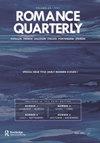云机器告诉我们早期现代情感
IF 0.2
3区 文学
0 LITERATURE, ROMANCE
引用次数: 1
摘要
摘要尽管19世纪的艺术评论家约翰·罗斯金哀叹艺术家们对天空和云层的观察不够,但17世纪的舞台机械师在舞台上对云层形成的精确性与气象学家不相上下。在17世纪末的法国戏剧中,云把舞台框成了一个舞台,它们降低和提升了天体或其他飞行物体,绑架了人物,充当了给舞台带来美感和深度的照明容器,并隐藏了各种可能会破坏布景可信度的机械,所有这些都具有前所未有的气象精度。此外,考虑到当时与气象学习有关的人类生理学,考虑舞台机械师在多大程度上理解他们的机器与人体及其心理之间的联系也很重要。他们机器的戏剧背景不仅产生了一个心理时刻,而且机器部件的索具、弹簧和运动都是模仿笛卡尔灵魂激情的大型机械再现。从这个角度来看,舞台云可能是对自然外部世界的手工再现,但它们也是一种现场实验,揭示了人类情感内部世界的机制。通过探索舞台工程师不仅是自然哲学家,而且是笛卡尔机器心理学家的可能性,本文提出了安德罗德(1650)、卡德摩斯和赫敏(1673)和伊西斯(1677)关于舞台云的情感史。本文章由计算机程序翻译,如有差异,请以英文原文为准。
What cloud machines tell us about early modern emotions
Abstract While nineteenth century art critic John Ruskin laments that artists do not observe the skies and their clouds enough, seventeenth-century stage machinists were close to meteorologists in the precision they brought to cloud formations on stage. In French late seventeenth-century drama, clouds framed stages like a proscenium, they lowered and lifted heavenly or other flying bodies, abducted figures, served as vessels for lighting that gave beauty and depth to the stage, and hid all sorts of machinery that risked taking away from the set’s credibility, all with unprecedented meteorological precision. Moreover, given the human physiology that was tied to meteorological learning at this time, it is also important to consider the extent to which stage machinists understood the link between their machines and the human body and its psychology. Not only did the theatrical context of their machines generate a psychological moment, but the rigging, the springs, and the movements of the machine’s parts were large, mechanical recreations that imitated Cartesian passions of the soul. In this light, stage clouds may have been engineered, artisanal recreations of the external world of nature, but they were also a kind of live experiment that revealed the mechanisms of the inner world of human emotion. By exploring the possibility that stage engineers were not only natural philosophers but also Cartesian machine psychologists, this essay proposes an affective history of stage clouds in Andromède (1650), Cadmus et Hermione (1673), and Isis (1677).
求助全文
通过发布文献求助,成功后即可免费获取论文全文。
去求助
来源期刊

ROMANCE QUARTERLY
LITERATURE, ROMANCE-
CiteScore
0.30
自引率
50.00%
发文量
18
期刊介绍:
Lorca and Baudelaire, Chrétien de Troyes and Borges. The articles in Romance Quarterly provide insight into classic and contemporary works of literature originating in the Romance languages. The journal publishes historical and interpretative articles primarily on French and Spanish literature but also on Catalan, Italian, Portuguese, and Brazilian literature. RQ contains critical essays and book reviews, mostly in English but also in Romance languages, by scholars from universities all over the world. Romance Quarterly belongs in every department and library of Romance languages.
 求助内容:
求助内容: 应助结果提醒方式:
应助结果提醒方式:


